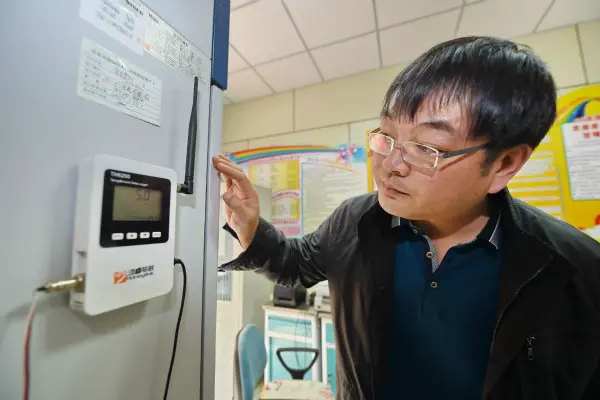Wholesalers are no longer allowed to trade vaccines following a case involving the sale of millions of dollars' worth of improperly stored vaccines, according to a government decision publicized Monday.
Premier Li Keqiang signed the decree on April 23, which was endorsed on April 13 at an executive meeting of the State Council, China's cabinet.
The decision to amend a regulation on vaccine circulation and use aims to address the problems identified by an investigation into the vaccine scandal, according to an official elaboration on the document.
The management of distribution channels and cold-chain storage will be improved and a national vaccine tracking system will be established.
Police in east China's Shandong Province announced in February that they had arrested a mother and daughter suspected of illegally selling improperly stored or expired vaccines worth more than 570 million yuan (about 88 million U.S. dollars) since 2011. The scandal aroused public ire on vaccine management and fueled parents' fears over the safety of their children.
Following the decision' release, China Food and Drug Administration confirmed it had uncovered illegal practice by 45 drug companies involved in the vaccine selling chain, including fabricating vaccine sales catalogue and selling the improperly stored vaccines to disqualified individuals and companies.
The administration will revoke the operation permits of 41 companies, and has transferred the cases of two companies, Hebei Shanggu Biotech Ltd. and Shannxi Bangxin Biopharmaceutical Ltd., to the courts. The other two companies have had their permits revoked.
Local public security authorities are also investigating some of those employed by the 45 groups. As of March, police had apprehended 130 people implicated in the scandal. Moreover, 357 officials will be fired or demoted.
Medical experts examined 24 batches of vaccine products confiscated in Shandong and all "met the standards," the administration said.
Earlier this month, health experts said those given the vaccines in question will not need to be re-vaccinated, but will qualify for free re-vaccinations if they wanted.
Banning wholesalers from selling vaccines
The latest decision reforms distribution channels for B-class, or non-compulsory, vaccines.
It requires B-class vaccines to be distributed in the same way as A-class ones, which are covered by the national compulsory immunization program and provided to the public for free.
B-class vaccines must be procured by county-level disease control institutions directly from manufacturers and dispatched to hospitals, all under the organization of provincial-level disease control departments, according to the decision.
Virtually all vaccine circulation must follow official arrangements.
Gu Weijun, head of a medical and pharmaceutical engineering equipments association, said the vaccine case showed that the distribution chain of B-class vaccines was too long, allowing wholesalers, disease control agencies and clinics along this chain to profit.
These stakeholders may be motivated by profits to participate in illegal activities, Gu added.
The new requirement, for county-level disease control institutions to procure directly from manufacturers and dispatch to hospitals, simplifies the distribution channel and improves transparency, said Song Hualin, professor of law school of Nankai University.
However, Gu said, banning drug wholesalers from selling vaccines does not mean excluding them from the entire distribution process. Those that qualify can transport vaccines, so that their expertise in drug cold-chain transportation can be put to good use.
The decision also requires disease control organs, hospitals and clinics to keep clear records of their purchases and received inventory.
Improving cold-chain storage, transportation
The decision also improves management of cold-chain storage and transportation, prohibiting vaccines from leaving the cold-chain system and requiring regular temperature monitoring.
Institutions or hospitals must receive storage temperature records alongside vaccines, said the decision.
The revision has clarified obligations of all participants in the cold chain from upstream manufacturers to clinics, said Zheng Jingshan, a doctor with the immunization program center of the Chinese Center for Disease Control and Prevention.
Song Hualin said that vaccines are sensitive to temperature, and they need to be manufactured, transported and stored before reaching patients. Any exposure to high temperatures may compromise their efficacy.
Vaccine tracking system
China will set up a vaccine tracking system, according to the decision, and enterprises and user agencies must record the circulation and use of vaccines so that even the smallest vaccine package can be pinpointed anywhere in its entire life cycle.
All agencies handling vaccines must report vaccines without a clear source or recognizable packaging to drug authorities. These vaccines will be destroyed.
The system will spur the vaccine producers to improve quality management over their products and ensure their safety and effectiveness, said Song.
The decision also improved accountability for vaccine producers, medical units and supervision authorities.
Those found to be improperly storing and transporting vaccines will face high fines and may be prohibited from running businesses for five to ten years. Local officials must resign if they fail to perform their supervision duties well.
The decision took effect on April 23.
 简体中文
简体中文

